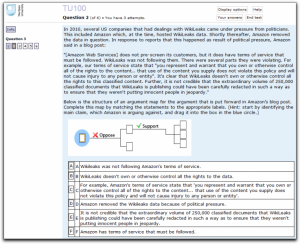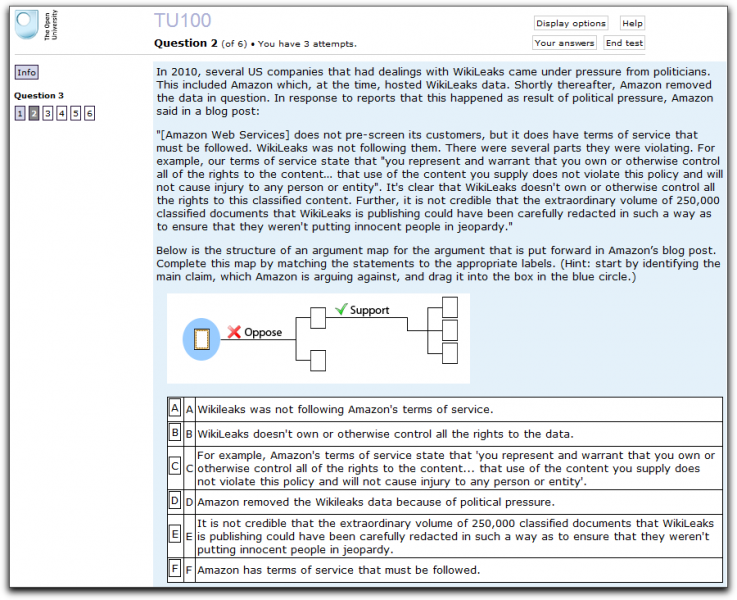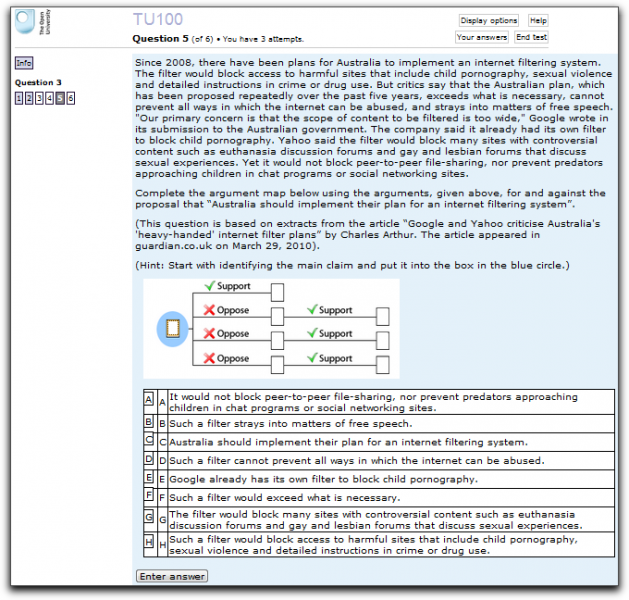News Story
OU rolls out Argument Mapping in its VLE
Thursday 29 Mar 2012
One of the research fields which KMi leads is Computer-Supported Argumentation, in particular, Argument Mapping — the visualization of the structure of an argument or debate for greater comprehension, better analysis, and collaborative sensemaking. A great example of knowledge transfer to the OU’s frontline is the ArguEd project led by Paul Piwek (Maths, Computing & Technology Faculty), an OU strategic project aiming to provide “evidence-based improvement of VLE-based formative assessment of students’ argument analysis and evaluation skills.”
To quote the site’s summary:
“CONTEXT: The ability to analyse and evaluate arguments is a key transferable skill. Firstly, it is an indispensable skill for study at Higher Education level. From the University’s point of view, retention is likely to be better for students that have mastered it. Secondly, it is central to many employability skills such as “negotiating/persuading, contributing to discussions”, “analysing facts and situations” and “the ability to produce clear, structured written work and oral literacy”. Finally, it is a skill that helps citizens to assess their own and other people’s arguments both on issues of personal importance and questions about the society they live in.
RESEARCH QUESTION: The presentation of TU100 (“My Digital Life”), which includes a part (Part 5, Block 5) dedicated to argument analysis skills, presents an opportunity to collect data from relevant iCMAs and TMA questions for answering the question: Which mistakes do students make when analysing arguments and how can we help them avoid these mistakes?”
Paul showed me the introductory tutorial on argument mapping in the OU’s Moodle-based VLE (using the OU’s OpenMark formative assessment technology), and the integrated drag+drop interface for students to complete simple argument map templates, in their analysis of a target text. The screens show how the learner drags the statements into the template in order to demonstrate their ability to parse the text into the top level claim, and supporting/challenging premises/sub-premises. Learners can then check their map, which preserves the elements in the correct place, but leaving them to try again with those they got wrong.
Fabulous to see this in use by 2000 students, and hopefully something that will spread to other faculties, now that the infrastructure is in place within the OU’s VLE. Kudos to Paul for all his hard work!
Related Links:


Latest News
OU Vice-Chancellor visits KMi: A showcase of Innovation and Impact
Explainable AI study on Education Equity awarded Best Paper at ICAITE 2025
ClimateSense team wins top places in two international misinformation challenges
Assessing the Impact of Artificial Intelligence on the Gender Pay Gap
PhD Awarded for Groundbreaking Research on Game-Based Cyber Security Training

